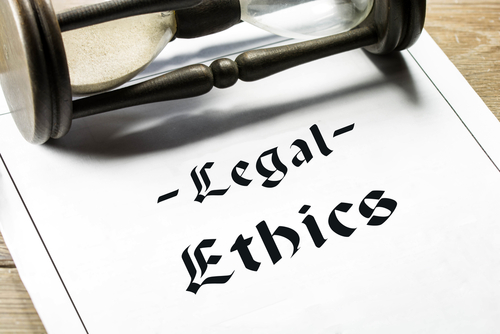Suspension sought for lawyer who lobbed insults, citing Trump; he also accused judge of 'robe rage'

Image from Shutterstock.com.
An Illinois ethics hearing board has recommended a three-month suspension for a Chicago lawyer who insulted an opposing lawyer and defended his words by pointing to President Donald Trump.
The lawyer, Charles Andrew Cohn, used “abusive and vulgar language” during a November 2016 deposition that took place two days after Trump was elected, according to findings of fact by the hearing board of the Illinois Attorney Registration & Disciplinary Commission.
The Legal Profession Blog posted highlights, while Law.com and Law360 have coverage.
Cohn also made false or reckless statements when he said the judge who criticized his comments had engaged in “robe rage,” the hearing board said in its April 29 report and recommendation.
Cohn practices law with his father, Erwin Cohn, who is defending him in the ethics case. Erwin Cohn told the ABA Journal that the last time he spoke with his son, he planned to appeal the recommendation.
The elder Cohn called the report and recommendation “the most unfair thing I’ve ever seen.”
Charles Cohn made the comment about Trump in an exchange with lawyer Keely Hillison during a deposition. The elder Cohn was not present.
The conflict began when Cohn instructed his client not to answer a question, according to the hearing board. Hillison responded to certify the question.
“OK,” Cohn replied. “Then certify your own stupidity at this point.”
“Counsel, I’m not going to sit here and take insults from you,” Hillison said.
“At this point in time,” Cohn replied, “a man who insults on a daily basis everybody he does business with has now been elected president of the United States. The standards have changed. I’ll say what I want.”
In another exchange, Hillison began to ask about attorney fees because Cohn’s client had requested them.
“Don’t waste your breath,” Cohn said, before directing his client not to answer. When Hillison again asked that the question be certified, Cohn said, “Motion for sanctions; indicate that on the record. I’m going to get sanctions against your firm like you wouldn’t believe, b- - - -.”
Hillison filed a motion to compel that sought to overrule Cohn’s objections to her questions. In a December 2016 hearing on the motion, Judge Franklin Valderrama chastised Cohn for his statements. Hillison and a lawyer representing another party in the case both testified that Valderrama remained calm and did not raise his voice. Cohn thought the judge was very angry with him.
In the court filing responding to the motion to compel, Cohn said the judge had flown into a rage over his deposition comments and described the incident as “robe rage.”
The hearing board said Cohn’s deposition comments were made for the purpose of disrupting the proceeding. The comments “had no valid purpose,” the hearing board said. “They were objectively insulting and vulgar, and Hillison credibly testified they made her feel embarrassed and verbally abused.”
Although Cohn insists that he thought that Valderrama was angry, “he has not identified any objective facts that support his perception of anger, much less rage,” the hearing board said.
Erwin Cohn told the ABA Journal that Valderrama did not testify in the ethics case, despite being subpoenaed.
“We begged him to testify,” Erwin Cohn says. Without the testimony, there wasn’t enough evidence of an ethics violation, the elder Cohn says.
Erwin Cohn says “road rage” was “sort of a cutesy term” to describe Valderrama’s apparent anger. “Whether it was rage or not, it sure sounded like it,” he says.
Erwin Cohn says his son never disrupted any proceedings, and he never sought a substitution of judge.
“The only thing he ever really asked was an assurance by the judge that he could be impartial, and he never carried it any farther,” Erwin Cohn says.
He also says his son’s use of the B-word was not necessarily derogatory.
“Maybe some of the things he said could be more judicious, but there was nothing that derogatory,” Erwin Cohn says.
He says Hillison was “well-seasoned, well-respected and acknowledged to be a tough competitor.” Hillison and his son were still able to work together to resolve the case, Erwin Cohn says.
“There was no hard feelings between Charlie and her,” he says. “They were very civil.”
Write a letter to the editor, share a story tip or update, or report an error.


